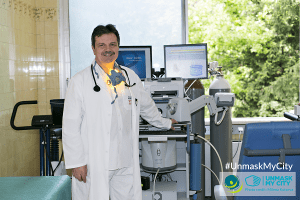HEAL calls on European Commission President Ursula von der Leyen to commit to protecting people’s health from the triple crisis during her second term in a letter. HEAL urges her to safeguard and strengthen the EU climate and environmental acquis for better health, and accelerate on the zero pollution path, including for the foreseen reform of the EU chemicals law REACH.
 A coalition of nine doctor and health organisations1 has today joined the global Unmask My City initiative, calling for greater urgency in achieving clean air in Sofia. The Bulgarian capital is one of the most polluted cities in the whole European Union (EU).
A coalition of nine doctor and health organisations1 has today joined the global Unmask My City initiative, calling for greater urgency in achieving clean air in Sofia. The Bulgarian capital is one of the most polluted cities in the whole European Union (EU).
Air quality is not only poor in Bulgaria’s capital – air pollution leads to significant health impacts all over the country. The World Health Organization (WHO) estimates that Bulgaria has the third highest mortality rate (per 100.000 population) from air pollution in the world, after North Korea and Bosnia and Herzegovina, eating up the equivalent of 29.5% of the country’s GDP through reduced productivity and costs of treating the diseases caused.
 Dr. Alexander Simidchiev, Chairman of the Executive Board of the Association Air for Health stated: “As a lung expert, I am very concerned about the poor air quality in Sofia. Polluted air can affect lung development in children, cause or worsen asthma, allergic disorders and the lung disease COPD that means permanent narrowing of the airways, not to forget lung cancer. It is dangerous for every single person to ignore the pollution problem – we must act now for better air quality now and we will see immediate short term benefits for our health as well as save our children and grandchildren a lot of future trouble.”
Dr. Alexander Simidchiev, Chairman of the Executive Board of the Association Air for Health stated: “As a lung expert, I am very concerned about the poor air quality in Sofia. Polluted air can affect lung development in children, cause or worsen asthma, allergic disorders and the lung disease COPD that means permanent narrowing of the airways, not to forget lung cancer. It is dangerous for every single person to ignore the pollution problem – we must act now for better air quality now and we will see immediate short term benefits for our health as well as save our children and grandchildren a lot of future trouble.”
The poor air quality in Bulgaria means the country has been in continuous breach of EU air quality standards. In 2017, Bulgaria was the first country to be sentenced by the EU Court of Justice to take action to improve air, and the country is still facing potential high fines.
Vlatka Matkovic Puljic, Senior Policy Officer for Health and Energy at the Health and Environment Alliance explained:
“Air pollution is the top environmental health concern in Bulgaria and in the EU as we saw earlier this month with the European Commission referring six countries that show high and permanent levels of air pollution in their cities to the European Court of Justice. Health groups are concerned that the Bulgarian government is not walking the talk on clean air. While policy-makers proclaimed air quality a priority for the current EU presidency, they are at the same time working to allow more air pollution, not less. I hope that many more doctors, patients and health experts will join the clean air efforts and prompt the government to act.”
Through the Unmask My City initiative doctors and health groups are calling for concrete and tangible solutions for the citizens of Sofia and Bulgaria, including:
- Comply with legally binding EU air quality standards.
- Establish air quality standards (limit values) for PM10 and PM2.5 in accordance with recommendations of the World Health Organization.
- Health professionals should become engaged on air quality including on policy changes, inform the public on health risks due to air pollution and alert their patients when air pollution exceeds EU or WHO guidelines.
- Move away from coal energy to renewable energy sources and promote energy savings. Prioritise energy efficiency and renewable energy projects.
- Promote renewable energy systems for household heating and transitioning away from fossil fuel use.
- Put strict emissions standards for vehicles in urban zones; and implement the “polluter pays” principle with sanctions for those not sticking to the rules.
- Make active travel including walking and cycling and sustainable public transport the backbone of city transport policies.
 Learn more about the Unmask My City here http://unmaskmycity.org/
Learn more about the Unmask My City here http://unmaskmycity.org/

HEAL gratefully acknowledges the financial support of the European Union (EU). The responsibility for the content lies with the authors and the views expressed do not necessarily reflect the views of the EU institutions and funders. The Executive Agency for Small and Medium-Sized Enterprises (EASME) and the funders are not responsible for any use that may be made of the information contained in this publication. HEAL EU transparency register number: 00723343929-96


